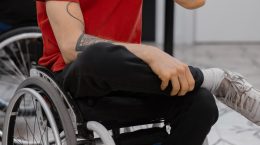A coronavirus vaccination campaign is currently underway all over the world. People who are tired of quarantine are vaccinated en masse to start travelling faster, go to cafes and restaurants, and return to their life. There are several drugs from different countries to choose from, and people readily get vaccines because world politicians, stars, scientists are sure of the quality of the medicine. But in Belarus, they are forced to get vaccinated according to the order form above, just like visiting hockey games and concerts. Only two coronavirus vaccines are in the country: the Russian Sputnik V and the Chinese Sinopharm. Both of them are not recognized by the European Medicines Agency – and both do not inspire confidence among Belarusians.
Belarus became the first foreign country to register the Russian Sputnik V vaccine on December 21, 2020. At the same time, since October 2020, Belarus has been vaccinating volunteers with this drug. At the end of March, the Belmedpreparaty enterprise began industrial production of the Sputnik V. They promised to make up to 500 million doses per month. And Chinese vaccine appeared in Belarus in an amount of fewer than 500 thousand doses. Lukashenka preferred the Russian vaccine, not recognized by the European Medicines Agency and the World Health Organization. As for the rest of the vaccines, according to Deputy Minister of Health Elena Bogdan, negotiations with the manufacturers of Western vaccines AstraZeneca and Pfizer were held:
– They didn’t come to us, and negotiations are not conducted anymore. Meanwhile, we are negotiating the supply of Pfizer to us with the participation of the US Embassy. Answer: if it remains, we will give it to you.
What is the Sputnik V vaccine, and how does it work
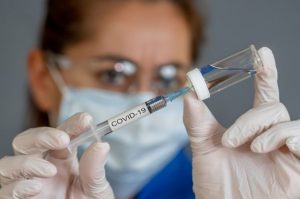 Since the beginning of the pandemic, the Russian Direct Investment Fund (created by the Russian government) has invested a lot of money in the fight against coronavirus. The Fund invested more than 4 billion Russian rubles in the vaccine. On April 20, 2020, the National Research Center named Gamaleya received the state task for vaccine creation. Another 50 million Russian rubles were allocated by Sberbank, owned by the National Wealth Fund, also controlled by the Russian government.
Since the beginning of the pandemic, the Russian Direct Investment Fund (created by the Russian government) has invested a lot of money in the fight against coronavirus. The Fund invested more than 4 billion Russian rubles in the vaccine. On April 20, 2020, the National Research Center named Gamaleya received the state task for vaccine creation. Another 50 million Russian rubles were allocated by Sberbank, owned by the National Wealth Fund, also controlled by the Russian government.
Sputnik V, or Gam-COVID-Vac, is a vector-based two-component vaccine based on human adenovirus. It was named in honour of the space satellite launched by the USSR in 1957, which intensified space research, according to the developer of the drug – National Research Center for Epidemiology and Microbiology named after Gamaleya. World scientists develop more than 160 coronavirus vaccines, but Sputnik V was the first registered one. The letter V stands for victory.
The drug consists of two components. Both contain the S-protein carrier gene of the SARS-CoV-2 virus. The vaccine is injected into patients intramuscularly in two stages with an interval of three weeks. The development of a vaccine that does not have serious side effects began in May 2020, and clinical trials (phases I and II) were completed by August. On August 11, 2020, the drug was registered, and on August 15, industrial production began.
Phase III of clinical trials with the participation of 40 thousand people began on August 26, 2020, in Moscow. The completion of this phase is scheduled for the end of December 2022. At the same time, the effectiveness of Sputnik V in the February 2021 study showed a result of 91.6 per cent. On June 16, 2021, the Gamaleya National Research Center confirmed that Sputnik V is also effective against the delta strain of coronavirus.
Facts about the developer of the vaccine – National Research Center for Epidemiology and Microbiology named after Gamaleya
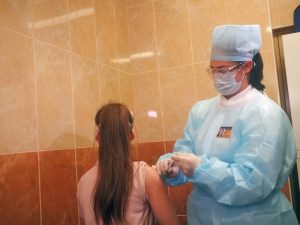 The Gamaleya National Research Center for Epidemiology and Microbiology was founded in 1891. In this facility, scientists work in the spheres of epidemiology, medical and molecular microbiology, immunology. The drugs viferon (for the treatment of hepatitis C), cytoflavin (a complex of vitamins) and vaccine against Ebola were created in the Gamaleya Center.
The Gamaleya National Research Center for Epidemiology and Microbiology was founded in 1891. In this facility, scientists work in the spheres of epidemiology, medical and molecular microbiology, immunology. The drugs viferon (for the treatment of hepatitis C), cytoflavin (a complex of vitamins) and vaccine against Ebola were created in the Gamaleya Center.
However, over the past 11 years, no vector vaccine has been introduced by the Gamaleya Center. In 2009, the institution received an order from Rusnano for three vaccines, including one against influenza, for 1.6 billion Russian rubles. The AdeVak-Fly vaccine was released in 2015 – since that year, it has been undergoing clinical trials and has not been registered. And in 2020, it turned out that 400 million Russian rubles were stolen from Rusnano during the project.
Another anti-flu drug, GamFluVak, which the institute started developing in the mid-2010s, also did not enter the market. Almost 45 million Russian rubles were allocated for the vaccine of the Center named after Gamaleya.
In 2014, when the Ebola epidemic began in Africa, the institute created a vaccine against it. In 2016, Vladimir Putin announced the registration of a Russian drug against Ebola. It caused admiration in the world community because no one in the world had managed to release the drug until that moment. However, the documents on the conducted clinical trials were not received by the WHO. Russian vaccines were not used in new outbreaks of Ebola. Clinical trials of the vaccine, according to the Center named after Gamaleya, are still underway.
Although, it is worth noting that the drug was injected into 2 thousand citizens of the Republic of Guinea. The government even awarded the “Order of Merit” to Academician Alexander Ginzburg, the head of the institution. And in 2017, a study on the Russian vaccine was published in a small medical journal, “Human vaccines and Immunotherapy”, which is not even in the top 50 scientific journals of the planet.
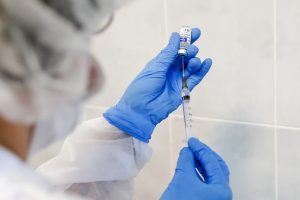 Another invention of the Center named after Gamaleya, also forgotten by everyone, is a vaccine against the Middle East respiratory syndrome, registered in 2012 in Saudi Arabia. Cases of the disease were recorded in 27 countries of the world. According to some reports, this is the closest “relative” of COVID-19. Alexander Ginzburg said that a vaccine against this virus has been created in his institution. But the World Health Organization in 2020 stated that there is currently no specific drug or vaccine for this disease.
Another invention of the Center named after Gamaleya, also forgotten by everyone, is a vaccine against the Middle East respiratory syndrome, registered in 2012 in Saudi Arabia. Cases of the disease were recorded in 27 countries of the world. According to some reports, this is the closest “relative” of COVID-19. Alexander Ginzburg said that a vaccine against this virus has been created in his institution. But the World Health Organization in 2020 stated that there is currently no specific drug or vaccine for this disease.
Sputnik V was developed with multiple violations. In particular, the employees of the Gamalei Institute were the first to experience it in May 2020, which contradicts federal laws – the permission of the Ministry of Health for people to receive the drug appeared in June 2020. The vaccine trial was supposed to be conducted by independent persons. But it took place with the participation of long-time friends of the administration: representatives of Sechenov University (where Alexander Ginzburg heads the Department of Infectology and Virology) and the Burdenko Hospital, where military personnel of the radiation, chemical and biological protection troops get treatment. The analysis of the results of the Sputnik V study was carried out by the Excellena organization, which receives state contracts from the Gamaleya National Research Center.
The effectiveness of Sputnik V is in doubt
Despite the impressive figures – 91.6 per cent according to the most authoritative medical journal “The Lancet” – experts and Russians are in no hurry to trust Sputnik V. As of July 23, 2021, only 13.7 per cent of Russians received both doses of the drug. And now, the country is on the verge of a new wave of coronavirus. The authorities take various measures to motivate people for protecting by Sputnik V drug. Moscow Mayor Sergei Sobyanin announced a raffle of cars among the vaccinated, governor of the Samara region Dmitry Azarov showed a personal example by injecting “Sputnik V”, the head of Bashkiria Radiy Khabirov decided to play smartphones and even an apartment among the vaccinated. In the Kursk region, pensioners will get 3 thousand Russian rubles for vaccination. In the Belgorod region, retired get free coupons for public transport, and in the Pskov region – a unified system of discounts for vaccinated people.
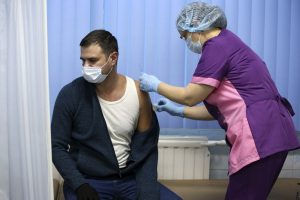 The authorities also use the resource of administrative pressure. So, in Moscow, everyone who works in trade, education, healthcare, social protection and public catering was obliged to get vaccinated. Employees of public transport, taxis, housing and communal services, beauty salons, massage parlours, client departments of banks and post offices, fitness clubs, theatres, children’s playrooms and other educational institutions should be vaccinated. If Russians do not want to vaccinate, they are threatened with suspension from work, lack of salary or even dismissal.
The authorities also use the resource of administrative pressure. So, in Moscow, everyone who works in trade, education, healthcare, social protection and public catering was obliged to get vaccinated. Employees of public transport, taxis, housing and communal services, beauty salons, massage parlours, client departments of banks and post offices, fitness clubs, theatres, children’s playrooms and other educational institutions should be vaccinated. If Russians do not want to vaccinate, they are threatened with suspension from work, lack of salary or even dismissal.
Vasily Vlasov, a professor at the Higher School of Economics, a Russian epidemiologist, claims, that the reason for the failure of the vaccination campaign in Russia is an attack on Western vaccines, the spread of misinformation about their ineffectiveness. The authors of the campaign were the Russian authorities. They spread rumours about the vaccines of the companies Moderna and BioNTech. In addition, the clinical trials of the drug also affected, the specialist clarifies:
– The first and second phases of the trials were conducted at an accelerated pace. A small number of people took part in it. There were violations of many requirements of the international organization for the harmonization of clinical trials. It has left its mark. There was active propaganda by all the mass media of Russia, who told about what defective foreign vaccines are and what serious complications they cause. It, of course, raised a question among Russians, who are well aware that German cars are better than Russian ones. It is difficult for them to assume that the Russian vaccine is better than the German one.
Czech molecular virologist Ruth Takhesi adds: “For specialists, questions arise in the case of this vaccine because it was approved by Russian authorities even before the third phase of research began at all. Of course, all vaccines can have side effects, which usually manifest themselves after people receive vaccinations. But for comparison, there are data on testing other vaccines. The control group and the placebo group were tested. In the second phase, the vaccine is usually tested on groups of different ages — the elderly, children, people of productive age, to understand whether there is a difference in reactions to the vaccine depending on age. All these indicators have not yet been tested for the Russian vaccine.”
Ilya Yasny, the head of the scientific expertise of the Inbio Ventures Foundation, also doubts the quality of the vaccine: “The Sputnik V clinical trial was initially so poorly planned that it does not matter whether to continue it or not. Anyway, we would hardly have learned clear information from it, and even then, it is unclear whether people can trust it. The protocol of the clinical trial of the vaccine is bad: my biggest complaint about it is that it does not have an algorithm of action to determine whether a volunteer got sick with coronavirus during the research or not.”
Russians also agree with these opinions. Having been vaccinated with Sputnik V, many of them felt disappointed — the test for antigens to the coronavirus did not show their presence. It turned out that 8 per cent of vaccinated people may not form them for various reasons. People do not trust the drug so much that they even prefer to buy fake vaccination certificates and pay money to be included in the database of vaccinated people.
And what is in Belarus?
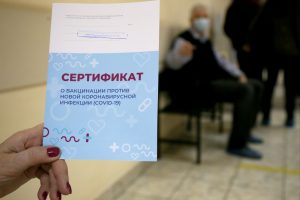 As of July 25, more than 800 thousand people were vaccinated with two doses against coronavirus in our country. As we have already written, Belarus became the first country to register Sputnik V. On December 22, 2020, the Minister of Health, Dmitry Pinevich, announced plans to vaccinate 5.5 million Belarusians. Doctors received the first vaccines on January 19, 2021. And by January 29, 10 thousand medicals had already been vaccinated. On January 26, 2021, Russian Prime Minister Mikhail Mishustin, at talks with the head of the Belarusian government Roman Golovchenko, announced the creation of joint production of a coronavirus vaccine:
As of July 25, more than 800 thousand people were vaccinated with two doses against coronavirus in our country. As we have already written, Belarus became the first country to register Sputnik V. On December 22, 2020, the Minister of Health, Dmitry Pinevich, announced plans to vaccinate 5.5 million Belarusians. Doctors received the first vaccines on January 19, 2021. And by January 29, 10 thousand medicals had already been vaccinated. On January 26, 2021, Russian Prime Minister Mikhail Mishustin, at talks with the head of the Belarusian government Roman Golovchenko, announced the creation of joint production of a coronavirus vaccine:
— Following the decision of the President of the Russian Federation Vladimir Putin and the President of Belarus Alexander Lukashenko, a joint production of a vaccine against coronavirus is being created on the territory of Belarus.
On February 8, the press service of the Eurasian Economic Commission announced the start of the production of Sputnik V in Belarus. It will be organized within the action plan for the production of medicines and medical substances. Drug release was launched on February 24, 2021, in the “Belmedpreraraty” factory. On February 26, a validation batch of 15 thousand ampoules was launched. Ampoules were sent for examination for stability and effectiveness to the Gamalei Research Center. On March 25, the industrial production of Sputnik V began.
On February 23, 2021, Sputnik V was approved by the Ministry of Health for patients over 60 years of age. Its effectiveness was tested by the chief freelance infectious disease specialist of the Ministry, Igor Karpov. Since March 15, 2021, vaccination has become even more active, according to the Ministry of Health.
“Our job is to protect you from these different strains. We have enough places, including in the Grodno region. It is necessary to vaccinate — do not worry, we will vaccinate everyone who wants. We will give everyone a shot,” Lukashenko said during a visit to the Dairy World enterprise in Grodno on March 19, 2021.
Mass vaccination in Belarus, according to media reports, began in April. Dmitry Pinevich pointed out that about 60 per cent of Belarusians plan to be vaccinated. Lukashenko also spoke in favour of the possibility of providing vaccines for a fee – both to Belarusians and citizens of other states:
– People want to get a vaccine. They’ll get it. Someone wants to buy a vaccine from other countries faster, okay, we will buy it. Let it be on a paid basis. Don’t hide it. It is necessary to open the opportunity for someone to get a vaccine on a paid basis. It is a matter for every person.
Let us clarify that vaccination is carried out free of charge all over the world. For example, in neighbouring Lithuania, drugs can be obtained even for foreigners — they will not require money from them, they will get the same certificate of vaccination as the Lithuanians.
Together with Sputnik V, the illegitimate government thought about producing its vaccine. “The domestic vaccine is a matter of honour for Gusakov and Pinevich, the Ministry of Health and the National Academy of Sciences, to make the best vaccine in the shortest possible time. Why the best — because the experience is already there from the Russians, Europeans, Chinese and the Indians. Many people already produce these vaccines. We already know something. We are not doing this out of nowhere,” Lukashenko said on March 26, and on April 1, he signed a decree on the creation of a Belarusian drug for coronavirus. Ministry of Health says that we will see the ampoules in early August 2021.
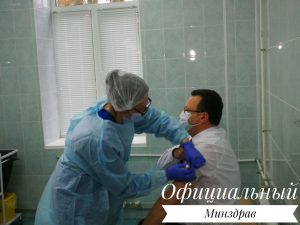 On April 16, 2021, the Ministry of Health released the news that the Minister of Health, Dmitry Pinevich, get “Sputnik V” vaccine of Belarusian production. However, it is not difficult to notice the trees with orange foliage in the photo – proof of the new deception of the Ministry of Health.
On April 16, 2021, the Ministry of Health released the news that the Minister of Health, Dmitry Pinevich, get “Sputnik V” vaccine of Belarusian production. However, it is not difficult to notice the trees with orange foliage in the photo – proof of the new deception of the Ministry of Health.
Meanwhile, Belarusians are in no hurry to be vaccinated against coronavirus with a Russian drug. The distrust of the officials that have formed throughout the coronavirus pandemic is affecting. Therefore, the authorities use administrative pressure in an old-fashioned way. Stories that people are threatened with dismissal from work because of their unwillingness to get vaccinated appear in Telegram channels. The employees of Minsktrans faced it. In Orsha, doctors refused to sign a working medical commission without vaccination with Sputnik V. The same thing happened in the Bereza district. In Borisov, officials accused doctors of disrupting vaccination, lack of agitation to delay the epidemic and get “covid” allowances longer. One of the republican retail chains received an order about compulsory vaccination with a Russian vaccine.
What are the advantages of Sputnik V
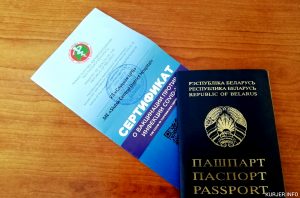 Belarusians have no motivation to get vaccinated with Sputnik V, not only because of distrust of the Russian vaccine. With a vaccination certificate with this drug, our citizens will not be allowed, for example, to relax abroad — they will still have to do a test or serve quarantine. After all, Sputnik V is not recognized by the European Medicines Agency. You can’t even get to Ukraine with Sputnik V. The state Border Service of the country explained that only those who got vaccines approved by the World Health Organization would be allowed in – and Sputnik V is not among them.
Belarusians have no motivation to get vaccinated with Sputnik V, not only because of distrust of the Russian vaccine. With a vaccination certificate with this drug, our citizens will not be allowed, for example, to relax abroad — they will still have to do a test or serve quarantine. After all, Sputnik V is not recognized by the European Medicines Agency. You can’t even get to Ukraine with Sputnik V. The state Border Service of the country explained that only those who got vaccines approved by the World Health Organization would be allowed in – and Sputnik V is not among them.
In addition, the validity period of Sputnik V is up to 9 months. There are cases when people do the third vaccination even earlier because the level of antigens fell. Еhe effectiveness of Sputnik has not been proven against a new strain of coronavirus. This conclusion was reached by scientists from the United States and Argentina. They analyzed the neutralizing ability of blood serums vaccinated with the Russian vaccine. They took blood serum samples from Argentines vaccinated with Sputnik and tested its neutralizing reaction against the South African strain and the variant with the E484K mutation in the S-protein. It turned out that the vaccine does not work on a specific mutation. So, when infected, the vaccinated are threatened only with a facilitated course of the disease – at the same time, there is a risk that they will infect others.
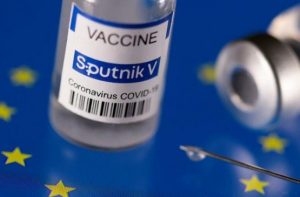 And more. Since Belarus promises to produce about half a million doses of Sputnik V, they plan to vaccinate foreigners. On July 1, Lukashenka signed a decree according to which citizens of 73 countries will be able to come to the country for up to five days for treatment without a visa from July 15. Those who want to get a vaccine only need to apply, buy the drug and get a vaccine in medical organizations, the list of which should be determined by the Ministry of Health. Among the 73 states – almost all EU members, the United States, Canada, Switzerland and Japan. It means that those vaccinated with a drug with insufficiently proven effectiveness risk spreading throughout Europe.
And more. Since Belarus promises to produce about half a million doses of Sputnik V, they plan to vaccinate foreigners. On July 1, Lukashenka signed a decree according to which citizens of 73 countries will be able to come to the country for up to five days for treatment without a visa from July 15. Those who want to get a vaccine only need to apply, buy the drug and get a vaccine in medical organizations, the list of which should be determined by the Ministry of Health. Among the 73 states – almost all EU members, the United States, Canada, Switzerland and Japan. It means that those vaccinated with a drug with insufficiently proven effectiveness risk spreading throughout Europe.
Lukashenka’s “kindness” is not a desire to improve relations with the EU, protect foreigners from a dangerous virus. It is a maniacal idea to make it worse for neighbouring countries, Europe – for everyone who opposed the torture of civilians on his orders. We hope that the decree will not attract foreigners and they will not sponsor the junta. I want to believe that Belarusians in the country will have access to high-quality vaccines that have passed the necessary tests and will not sacrifice their health because of the experiments of elderly dictators.
While we were preparing this material, it became known that an Indian strain of coronavirus is spreading in Belarus. On June 23, 2021, at least ten samples of patient tests in Minsk contained a set of mutations characteristic of the Indian strain. And on July 25, 2021, the strain was discovered in Gomel. At the same time, from July 15 to 19, the “Slavyanski Bazar” was held in the country, where foreign guests also came. And from July 23 to 24, the Vitebsk region hosted Viva Braslav, where thousands of spectators also gathered-as usual, without masks and checking vaccination certificates. Due to the inaction of an illegitimate state, it may well be that Belarus is on the verge of a new, more terrible epidemic.





